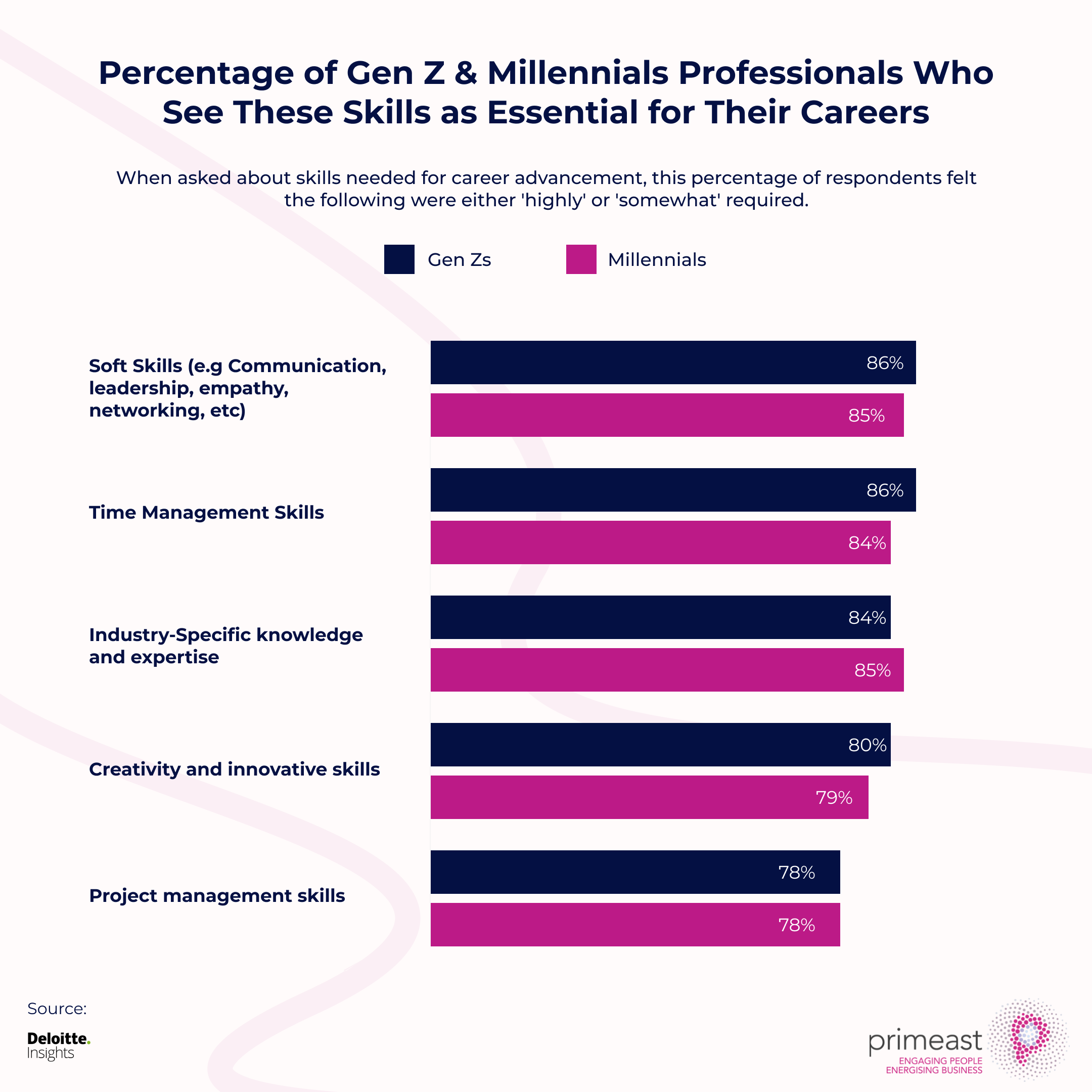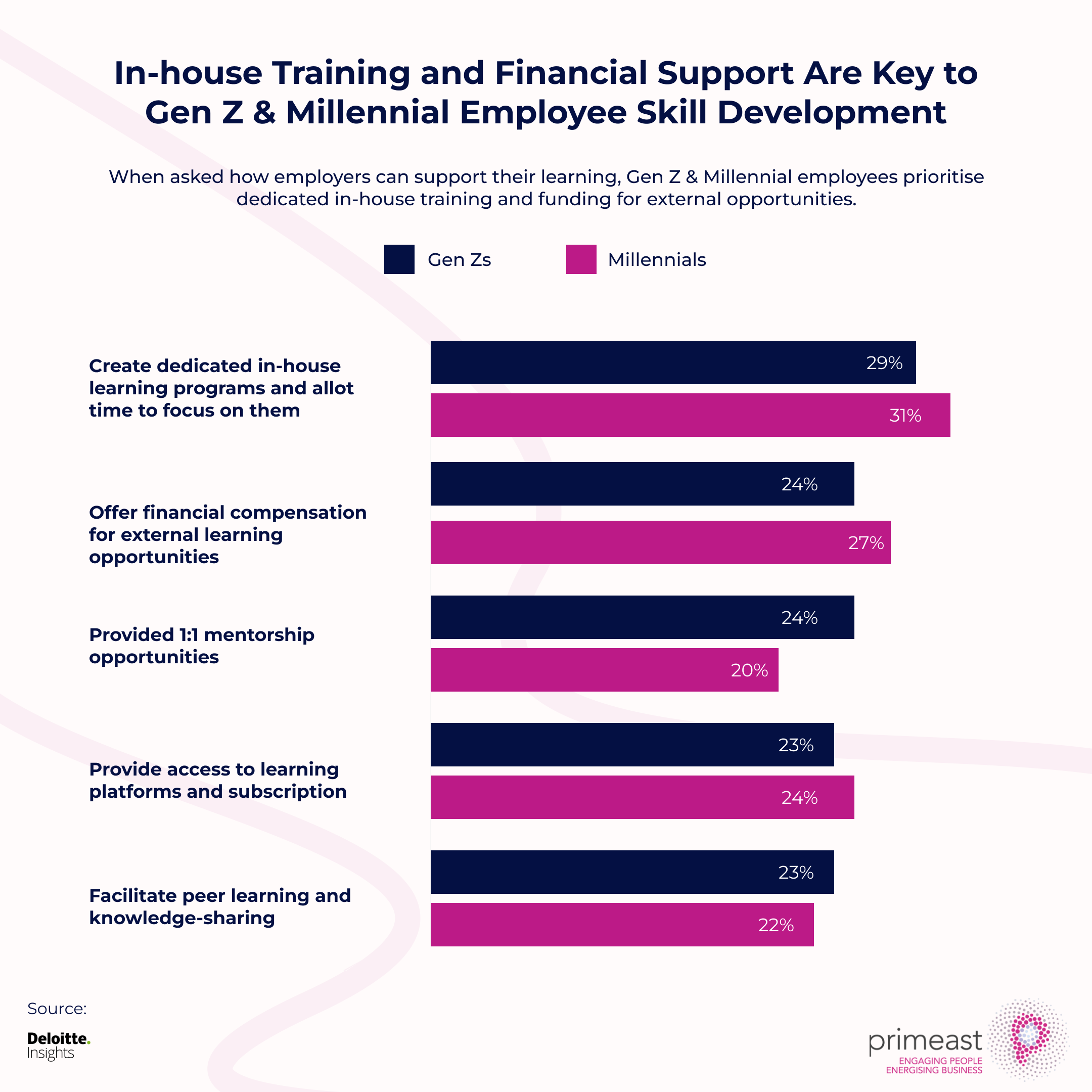
Are You Driving Your Future Leaders Away?
Key Takeaways:
- Gen Z wants a coach, not just a boss. They seek leaders who will actively mentor and invest in their growth. When they see managers overwhelmed and sacrificing connection for control, the role looks like a punishment, not a promotion.
- Purpose isn’t a perk; it’s the point. For this generation, a paycheck is not enough. Leaders must connect daily tasks to a wider, meaningful mission. Without that connection, work becomes a series of chores, and no one aspires to be the leader of chores.
- The old deal is off the table. The traditional trade-off, sacrificing personal well-being for a higher salary and title, is a deal Gen Z refuses to take. They measure opportunities against a balance of financial security, meaningful work, and a life outside the office. A leadership role that compromises any of these feels like a broken promise.
The leaders you need are already in your office.
By 2025, Gen Z will make up nearly a third of our workforce. They are skilled, driven, and ready to contribute. But they don’t want your job.
This isn’t a feeling; it’s a fact. A recent Deloitte survey found that only 6% of Gen Z employees see a senior leadership role as their main career goal [Deloitte – Gen Zs and millennials at work]. In the UK, it’s just 4%.
Why is the next generation turning away from the corner office?
The answer isn’t in their lack of ambition. It’s in the job we’re offering. The problem is the version of leadership they see every day, the one written in our own playbook.
This shift in ambition isn’t just a theory; the data shows that Gen Z’s focus is laser-sharp on practical skill acquisition. Research with Deloitte shows that when asked what they deem essential for career advancement, their priorities are not abstract perks but foundational professional skills:

The Manager-Mentor Gap
Your future leaders aren’t looking for a boss. They’re looking for a coach.
They expect a guide who will invest in their growth, but they often find only a taskmaster. According to Deloitte, half of Gen Z employees want their managers to mentor them, yet only 36% ever experience it [Deloitte – Gen Zs and millennials at work]. This gap doesn’t just cause frustration; it redefines what leadership means to an entire generation.
This desire for hands-on development is a clear expectation for Gen Zs. When we asked how employers can best support their learning needs, both generations overwhelmingly prioritised structured, supportive pathways over being left to figure things out on their own:

When young talent sees managers buried in spreadsheets and constantly putting out fires, the role looks less like a promotion and more like a punishment. They see a job that trades connection for control, and mentoring for monitoring.
Why would they climb a ladder that leads to a room with no view?
Purpose Is Non-Negotiable (And It’s Your Job to Connect It)
A paycheck is a start, but it’s no longer enough. For Gen Z, meaningful work isn’t a perk; it’s the entire point.
The data is clear: Nearly nine in ten young employees say purpose is critical to their job satisfaction, and 40% have rejected work that violates their ethics [Deloitte – Gen Zs and millennials at work].
This forces a change in the manager’s role. It’s no longer enough to just assign tasks. A manager must now answer the constant question, “Why does this matter?” A great leader connects a boring spreadsheet to the company’s mission to help customers.
They show how a routine report contributes to a bigger goal. One executive we recently coached at a global engineering firm called this ‘the moment the lights went on’ for her junior team.
Without that link, work is just a series of chores. And no one aspires to become the leader of chores.
| Aspect | Generation Z | Millennials | Generation X |
|---|---|---|---|
| Work Values | Pragmatic, prioritize financial security and career stability. | Idealistic, driven by experiences and passion. | Value independence and self-reliance. |
| Risk Appetite | Risk-averse, influenced by witnessing economic instability during their youth (e.g., the 2008 financial crisis). | More open to taking risks in pursuit of personal goals and experiences. | Cautious but willing to take calculated risks, shaped by the economic conditions of their time. |
| Technology Use | Highly connected, digital natives, adept at multitasking and handling multiple streams of information | Tech-savvy but grew up with the evolution of the internet and digital technology. | Adapted to digital technology later in life, but not as integrated as younger generations. |
| Communication Preferences | Prefer quick, concise communication, often through digital platforms. | Comfortable with both digital and face-to-face communication but leans towards digital tools. | More traditional in communication, prefer direct and face-to-face interactions, though adaptable to digital. |
| Collaboration | Highly collaborative, value teamwork and connection through digital platforms. | Collaborative, value teamwork but also seek personal recognition. | Independent workers, value autonomy and self-sufficiency. |
| Work-Life Balance | Value work-life balance, but willing to work hard for organizations that align with their values. | Strong emphasis on work-life balance, sometimes even prioritizing life experiences over work. | Value work-life balance, with a focus on balancing family responsibilities and career advancement. |
| Leadership Expectations | Expect transparency, authenticity, and ethical practices from leaders. | Desire leaders who are inspirational, inclusive, and supportive of personal development. | Prefer leaders who provide clear direction and allow autonomy. |
Source: [Most Effective Leadership Styles for Generation Z: A Review]
Well-being, Meaning, and Financial Security
For years, the deal was simple: trade your time and well-being for a bigger title and a better salary.
Gen Z isn’t buying it.
They aren’t just building a career; they’re building a life. They measure every opportunity against three simple questions:
- Does it pay the bills?
- Does the work matter?
- And will I have a life outside of it?
The old model of sacrificing health for the job is a deal they refuse to make. A recent survey shows 58% would take lower pay for better work-life balance, while 64% put peace of mind ahead of building wealth [Deloitte – Gen Zs and millennials at work].
This isn’t about avoiding hard work. It’s about avoiding burnout. With more than half of Gen Z living paycheck to paycheck, financial security is a constant worry. But a leadership role that forces them to sacrifice their health for the company’s bottom line isn’t an opportunity. It’s a broken promise.
Your Next Leadership Challenge
A new generation has arrived with a new definition of success. The old path to management, paved with personal sacrifice, leads nowhere they want to go.
This isn’t a retention problem. It’s a succession problem. The old career ladder is missing its top rungs because the jobs we need to fill are the ones our best people are now refusing to take.
But we shouldn’t be treating this a crisis, but as an invitation to do evolve.
It’s our chance to build a new kind of leadership. One that people are actually excited to be a part of.
If you’re ready to see how your current leadership model stacks up, you can start with Primeast’s free Leadership Readiness Assessment.



